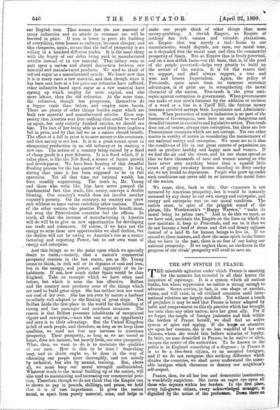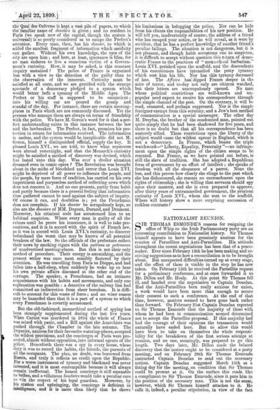THE SPY SYSTEM IN FRANCE. T HE miserable agitation under which
France is smarting for the moment has revealed in all their horror the iniquities of espionage. It is a system which all nations loathe, but whose suppression no nation is strong enough to advocate. Secret service, in fact, in one shape or another, exists, and will exist, in all civilised countries until inter- national relations are largely modified. Yet without a touch of prejudice it may be said that France is better adapted by habit and temperament to this sly practice which has wrought her ruin than any other nation, save her great ally. For if we forget the tangle of foreign jealousies and look within the borders of France herself, we shall find an active system of spies and spying. If she keeps an attentive eye upon her enemies, she is no less watchful of her own citizens, whom she would fain believe miracles of loyalty.' In brief, no man domiciled in France, be he native or alien, escapes the notice of the authorities. To be known to the police is in England something of a disgrace in France it is to be a free-born citizen, or an accepted foreigner, and if we do not recognise this striking difference which divides the countries, we shall never understand the miser- able intrigue which threatens to destroy our neighbour's self-respect.
France, then, for all her free and democratic institutions, is watchfully suspicious. She turns an eager eye upon all those who sojourn within her borders. In the first place, every full-grown citizen, every acknowledged stranger, is dignified by the notice of the prefecture. Down there on the Quai des Orfevres is kept a vast pile of. papers, to which the familiar name of dossiers is given; and no resident in Paris (we speak now of the capital, though the system is uni'versal) is so poorly considered as to escape the Prefect's attention. Every man, then, has his dossier, to which is added the smallest fragment of information which assiduity can gather. Without his on knowledge, the eyes of the city are up:in him ; and here, at least; ignorance it bliss, for no man endives tO live a conscious victim of a Govern- ment's curiosity. How, it may be asked; is this constant inquiry sustained? The police a France is organised less with a view to the detection of the guilty than to the observation of the innocent. • Curiosity mutt be Satisfied at all costs, and we are gratified with the strange spectacle of a democracy pledged to a system which would better befit a tyranny of the Middle Ages. The Prefect or ' his staff is supposed to be omniscient ; into his' 'willing ear are poured the gossip and scandal Of the day. For instance, there are certain meeting- places in Paris which are not commonly discussed. Yet the persons who Manage them are always On terms of friendship with the police. We have M. Goron's word for it that a per- fect understanding exists in this instance between the law and the lawbreaker. • The Prefect, in fact, promises his pro- tection in return for information received. The information is useless, and -the system would be inexplicable did not M. Goren, himself a distinguished official, supply the key. It pleased Louis XVI., we are told, to know what roysterers were abroad yesternight, -and -that the Monarch's curiosity might be satisfied a method of discovery was devised, which has lasted 'Unto this day. Was ever a droller situation dreamed even in comic opera ? The Revolution was brought about in the midst of bloodshed and terror that Louis XVI: might be deprived of all power to influence the people, and the people, by mere force of tradition, has carried on his own impertinent and purposeless method of collecting news which does not concern it. And no one protests, partly from habit and partly because there is a general feeling that information thus gathered cannot be used against the subject of inquiry. Of course it can, and doubtless is ; yet the Frenchman does not complain. If his dossier be scrupulously kept,- so also are the dossiers of MM. Dupont, Durand, and Drnmont. Moreover, his criminal code has accustomed him to an habitual suspicion. Where every man is .guilty of all the crimes until', he prove his innocence, it is well to take pre- cautions, and it is in accord with the spirit of French law, as it was in accord with Louis XVI.'s curiosity, to discover beforehand the worst that may be known of all potential breakers Of the law. So the officials of the prefecture collect their news by smoking cigars with the patron or patronnes of unadvertised meeting-places. But this is not their only method of procedure. Their energy is astonishing, and the present writer was once most sensibly flattered by their attention. He was travelling from Paris to Dieppe, and had fallen into a half-sleep, when suddenly he woke up to hear his own private' affairs discussed at the other end of the carriage: The speaker, a Frenchman, -had an intimate acquaintance with his habits and movements,' and only one explanation was possible : a detective of the railway line had committed an indiscretion from sheer boredom. It is diffi- cult to adcount for this waste of force ; and no wiser reason may be hazarded than that it is a part of a system-to which every Frenchman is covertly accustomed.
. But the old-fashioned, Monarchical method of spying has been strangely supplemented during the last five' years. When Carnot was murdered in 1894 the whole of France was seized With panic, and a Bill against the Anarchists was pushed through the Chamber in the life autumn. The Deputies, anxious for their favourite watering-places, accepted the wildest 'provisions; and the concierges of Paris were of inoted,ahnost, without opposition, into informal agents of the police. Henceforth there was a spy in every house, whose duty it, was to record the habits, the friends, the pursuits of all the occupants. The plan, no dOubt, was borrowed from Russia, and truly it reflects no credit upon the Republic. For a worse instrument of tyranny and blackmail was never invented, and it is most contemptible because it will alwayt; remain ineffectual. The honest concierge is still amenable to bribes; and a villainous locataire would take a peculiar care to win the respect of his legal guardian. Moreo#er, 'by his station and upbringing, the concierge is deficient in intelligence; and it is more than likely that le shows his limitations in befogging the pOlice. Nor can he hide from his clients the responsi ilitiea of his new position. He will tell you, inadvertently Of course; the address of a friend who has escaped your notice, Or he will reveal, as it were by accident, that he has a perfect knowledge of another friend peculiar failings. The situation is not dangerous, but it it not pleasant, and though habit accustoms one to suspicion, it is difficult to accept without question this return of demo- cratic France to the practices of " monaichical barbarism." Louis XVI. perished upon the scaffold, and the descendants of his executioners have intensified 'the petty tyranny which cost him his life. Nor has this tyranny decreased of late. The Affairs has', dipped France deeper in the mire of terror, and to-day not only are citizens watched, but their letters are unscrupulously opened. No man whose political convictions are well-known and Un- popular need expect to receive his correspondence through the simple channel of the post. On the contrary, it will be read, censured, and perhaps suppressed.'Nor is the simple foreigner exempt from this scrutiny, and a Jew's best method of communication is a special messenger. The other day M. Dreyfus, the brother of the condemned man, pointed out quite simply that he had been shadowed for five years, and there is no doubt but that all his correspondence has been austerely sifted. These restrictions upon the liberty of the subject would cause the wildest uproar in England, which is not a democracy. In France, which boasts the triple watchword—" Liberty, Equality, Fraternity "—no infringe- ment upon the simple rights of the citizen seems, to be resented. But, France, as we have pointed out before, is still the slave of tradition. She has adopted a Republican form of government by an effort of intellect ; she speaks of freedom with all the eloquence of a parrot. None the less, and this proves how closely she clings to the past which she has dishonoured, she resents no encroachment upon the rights of citizenship ; she is willing that servants should .spy upon their masters, and she is even prepared to approve,. after thirty years of untrammelled government, the prurient curiosity of Louis XVI., whom she sent to the scaffold. Where will history show a more surprising succession of reckless contrasts?







































 Previous page
Previous page